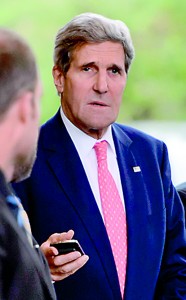Sunday Times 2
Iran nuke deal: Talks stretch into third day
View(s):GENEVA, Nov 09, (AFP) -Talks between Iran and world powers stretched into a third day today as top diplomats pressed for a deal on Tehran’s nuclear programme, warning that major obstacles remain.
After cutting short a Middle East tour to attend the talks, US Secretary of State John Kerry struck a note of caution as he joined his British, French and German counterparts who converged on Geneva on Friday.
“There is not an agreement at this point,” Kerry told reporters. “There are still some very important issues on the table that are unresolved.”

US Secretary of State John Kerry looks on upon arrival in Geneva on November 8, 2013 on the second day of talks with Iran on the country's nuclear programme. AFP
But hopes were rising for a deal, especially as Russian Foreign Minister Sergei Lavrov was expected to arrive in Geneva today.
Lavrov’s arrival would bring together the foreign ministers of all but one of the six world powers that have been negotiating for a decade with Iran over its nuclear programme.
Kerry, Iranian Foreign Minister Mohammad Javad Zarif and EU chief diplomat Catherine Ashton, who has represented world powers at the talks, held a long meeting late into the night on Friday.
It broke up around 11:30 pm local time (1030 GMT), with Kerry saying afterward only that it had involved “a lot of work”.
“Over the course of the evening, we continued to make progress as we worked to narrow the gaps. There is more work to do. The meetings will resume tomorrow morning,” a senior State Department official said.
“The meeting was productive but we still have lots of work to do,” Iran’s lead negotiator, Deputy Foreign Minister Abbas Araqchi, also said after the talks, confirming the negotiations would continue today.
If some sort of agreement is reached, it would be a breakthrough after a decade of negotiations between Iran and the P5+1 group comprising the United States, Britain, France, Germany, Russia and China.
The hoped-for agreement — seen as a first step ahead of further talks on a final deal — could see Tehran freeze its nuclear efforts for as long as six months in exchange for some relief from the sanctions that have battered its economy.
Reports say the proposed deal could see Tehran stop enriching uranium to 20 percent, which is just a few technical steps from weapons grade, reduce existing stockpiles and agree not to activate its plutonium reactor at Arak.
Global powers would in exchange take limited and “reversible” measures to ease sanctions, such as unfreezing some Iranian funds in foreign accounts.
‘Deal of the century’
Negotiators would then have time to work out a more comprehensive deal that Tehran has said it hopes could be in place within a year.
The possible deal already came under fire from Israel, which has staunchly opposed any easing of sanctions against Iran.
Israeli Prime Minister Benjamin Netanyahu, who hosted Kerry on a brief stopover before Geneva, urged world powers to back away from the agreement.
“Iran got the deal of the century and the international community got a bad deal, this is a very bad deal. Israel utterly rejects it,” Netanyahu told reporters.
Washington rejected the Israeli criticism, with White House spokesman Josh Earnest saying aboard Air Force One: “There is no deal. Any critique of the deal is premature.”US President Barack Obama also called Netanyahu after his remarks, the White House said.


